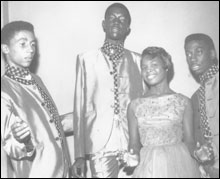Clement “Coxsone” Dodd’s Studio One genius
By WAYNE MARSHALL | April 12, 2006
 When people think reggae, the first name that comes to mind is Bob Marley. Far fewer know the name of the man who not only gave Marley and the Wailers their start but who was perhaps more instrumental in laying reggae’s solid foundation than any other individual: Clement “Coxsone” Dodd. A sound-system innovator, record producer, and the first black studio owner in Jamaica, Dodd parlayed entrepreneurial acumen and impeccable taste into one of the largest legacies in recorded music at Studio One, his studio and label. Studio One played a central role in the Jamaican ska, rocksteady, and reggae booms of the ’60s. And much of that music is now being reissued by the Rounder imprint Heartbeat.
When people think reggae, the first name that comes to mind is Bob Marley. Far fewer know the name of the man who not only gave Marley and the Wailers their start but who was perhaps more instrumental in laying reggae’s solid foundation than any other individual: Clement “Coxsone” Dodd. A sound-system innovator, record producer, and the first black studio owner in Jamaica, Dodd parlayed entrepreneurial acumen and impeccable taste into one of the largest legacies in recorded music at Studio One, his studio and label. Studio One played a central role in the Jamaican ska, rocksteady, and reggae booms of the ’60s. And much of that music is now being reissued by the Rounder imprint Heartbeat.
In addition to issuing hundreds of albums and countless hit singles, Studio One boasted a house band featuring the island’s finest players. Having cut their teeth in Kingston jazz bands and on the hotel and cruise-ship circuit, they were versatile virtuosos. Under the guidance of Dodd and his team of crack engineers — among them, Sylvan Morris and a young Lee “Scratch” Perry — Studio One’s band produced a corpus of backing tracks, or riddims, that would outpace even the original songs recorded on them, providing what has amounted to a Jamaican “Real Book,” of sorts. These riddims and recordings (sound quality is crucial to their character) have been versioned, re-licked, and sampled thousands of times over.

It was Dodd’s engagement with American culture — in particular, the music of African-Americans — that would prove his ticket to success. The sound of Studio One — a sound as engaged with contemporary R&B and soul as with Jamaican folk and pop traditions — expressed a new sort of cultural alignment for many Jamaicans. Jamaicans tuned into the sounds of America via radio broadcasts. Dodd himself was inspired by the jive-talk stylings of black radio DJs and began collecting R&B records while working in Florida. He returned to Kingston with big speakers and big plans. Before long, “Sir Coxsone’s Downbeat” was the eminent sound system (the name for mobile discos with stacks of speakerboxes) on the downtown scene.
As Dodd relates in liner notes to the reissues — The Best of Studio One,Full Up: More Hits from Studio One,Downbeat the Ruler: Killer Instrumentals from Studio One, and Bob Marley and the Wailers: One Love at Studio One 1964-1966 — when the American music industry shifted from R&B to rock and roll, he decided to meet the dancehall’s demand for more boogie-woogie and jump blues. The Jamaican music industry began advancing a sound as local as it was international. And Studio One became its premier outlet.
 Related
Related:
Timeline: Reggae in Boston, Reggae revival, Seminal ska, More 
- Timeline: Reggae in Boston
A timeline of reggae milestones in Boston
- Reggae revival
The climate is tropical, sweet skunk fills the air, and reggae jams are hitting such lofty decibels that I can't even feel my phone vibrate.
- Seminal ska
Heartbeat Records’ Studio One reissue series continues not only to shore up the legacy of Studio One honcho Coxsone Dodd but to present an expansive, rich portrait of Jamaican popular music.
- Stay positive
Chatting with Grow songwriter Matt Odabashian and resident rapper Sneaktechniks about their livin lovin learnin debut and upcoming CD release party, it was clear that the band has taken an admirable and ballsy approach to their music.
- Old Dogs, new tricks
After the Jungle Dogs went down in 1998, bandleader Tom Kutcher was keen on lightening things up.
- Interview: Crooked X
Before I climb onto the enormo tour bus of Oklahoma modern rockers Crooked X, I meet up with them at a Dunkin' Donuts, and witness their drummer, Boomer, ask his road manager, with a straight face, if they have Egg McMuffins here.
- Will Brandeis lose its swagger?
Ethnomusicologically invigorated Brandeis students and alumni are hoping for an outburst of criticism for the probable downsizing of Wayne Marshall.
- Clik tracks
Hide your naughty daughters and aspiring MC sons: Brooklyn’s Duck Down is that kingly retrofitted, incomparably propped hip-hop label that all of the boys and all of the girls are begging to fuck with.
- Chairmen of the boards
Not unlike Swedish, Tagalog, and Esperanto, music is a language, with its own conjugations and (lewdly) dangling participles.
- Número uno
Tego Calderón’s debut album, 2003’s El abayarde , caught the ears of both the reggaetón street and the critical elite. The rise of reggaeton: From Daddy Yankee to Tego Calderón, and beyond. By Wayne Marshall
- Various Artists: Galore Riddim
Every year, there’s one dancehall riddim to beat.
- Less

 Topics
Topics:
Music Features
, Entertainment, Music, Bob Marley, More  , Entertainment, Music, Bob Marley, Jazz and Blues, Blues Music, James Brown, Ska, Reggae, Willie Williams, Lee "Scratch" Perry, Less
, Entertainment, Music, Bob Marley, Jazz and Blues, Blues Music, James Brown, Ska, Reggae, Willie Williams, Lee "Scratch" Perry, Less 